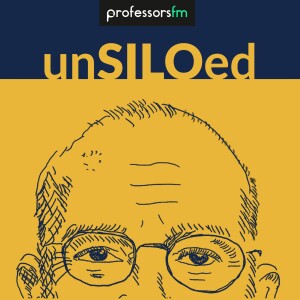
379. Using Math To Predict the Future feat. Kit Yates
 2024-02-01
2024-02-01
Math is all around us. When you’re debating when to cross the street to avoid oncoming traffic, you’re doing math. When you sing in the shower and you notice how your voice bounces and sounds, that’s math.
Kit Yates is a professor of mathematical biology at the University of Bath. His books, How to Expect the Unexpected: The Science of Making Predictions―and the Art of Knowing When Not To and The Math of Life and Death: 7 Mathematical Principles That Shape Our Lives look at real-world applications of scientific and mathematical concepts.
He and Greg discuss why the idea of math needs to be reframed, what it takes to scientifically predict the future, and why it’s more important than ever to have basic math skills in this world.
*unSILOed Podcast is produced by University FM.*
Episode Quotes:Math is a creative discipline
40:52: Maths is a creative discipline. Sometimes, it involves stewing and thinking about things, and in my case, it involves applying mathematics to the real world and building models of the real world. It's a really creative process because you've got to decide which bits you want to keep and which bits you can throw away, which are the most essential parts. And that's not a thing that you do in 10 seconds. This is something that you have to think really hard about and try and do trial and error and get things wrong, right? We don't encourage people to get things wrong enough. Getting things wrong is the way that you learn how to get things right. And in modeling, we go around in these cycles. When I'm doing a mathematical model of the biological process, we go through this process: model, predict, test, and alter. And then you go back. So you build your model, make a prediction, and then test it against biology, and it's not right. And that's good because you've learned something, and you go and change your model, make a new prediction, and go around the cycle. And this is how mathematical modeling works in general. But it's a really creative process.
You don’t need to be good at math to understand it
32:09: We don't need to be mathematical geniuses, but we do need to be aware of the places where mathematics can have an impact, and those are increasing in frequency over time. We're increasingly presented with more and more data.
On thinking of math in form of stories and narratives
03:09: We’re seeing the products of mathematics all around us all the time, and I think that I wanted to share that through the medium of stories because people connect with that. I wanted to tell the stories of real people's lives where they've been impacted by mathematics, perhaps without even being aware of it, so that other people who read the book can then be aware of what's going on and spot those situations when they start to come up.
It's better to be uncertain about a prediction than to trust a hundred percent in a poor prediction
05:56: We are so convinced that we're right; we fail to check the possibility that we could be wrong. We fail to ask the question, "What if I'm wrong?" And actually, we can get into trouble with that. It's much better to be uncertain and to admit and acknowledge that uncertainty about a particular prediction than it is to be 100 percent certain with the risk that the prediction is wrong.
Show Links:Recommended Resources:
- Bayes’ theorem
- Ponzi scheme
- Goodhart’s law
- Streisand effect
- Monty Hall problem
- John Forbes Nash Jr.
- Independent SAGE
Guest Profile:
- Faculty Profile at University of Bath
- Professional Website
His Work:
- How to Expect the Unexpected: The Science of Making Predictions―and the Art of Knowing When Not To
- The Math of Life and Death: 7 Mathematical Principles That Shape Our Lives
More Episodes
Create your
podcast in
minutes
- Full-featured podcast site
- Unlimited storage and bandwidth
- Comprehensive podcast stats
- Distribute to Apple Podcasts, Spotify, and more
- Make money with your podcast
It is Free
- Privacy Policy
- Cookie Policy
- Terms of Use
- Consent Preferences
- Copyright © 2015-2024 Podbean.com






